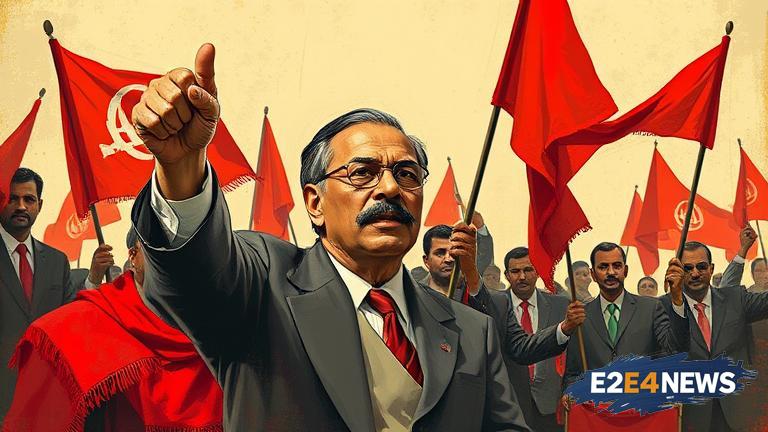Mamdani’s socialist campaign has been making headlines recently, with its promise to ban millionaires and redistribute wealth. However, a closer look at the campaign’s backers reveals a surprising truth: many of them are millionaires themselves. This has led to accusations of hypocrisy and raised questions about the campaign’s true motives. Mamdani’s campaign has been endorsed by several high-profile millionaires, who have donated significant amounts of money to support his cause. Despite this, Mamdani has continued to rail against the wealthy, calling for their ban and advocating for a more equal distribution of wealth. This has led to a backlash from critics, who argue that Mamdani’s campaign is nothing more than a thinly veiled attempt to gain power and influence. They point out that many of the millionaires backing Mamdani’s campaign have a vested interest in seeing him succeed, and that their donations are likely motivated by a desire to shape policy and protect their own interests. Furthermore, critics argue that Mamdani’s campaign is based on a flawed understanding of economics and that his policies would ultimately harm the very people he claims to be helping. They point out that socialism has been tried and failed in numerous countries around the world, and that it is not a viable solution to the problems facing society today. In addition, Mamdani’s campaign has been criticized for its lack of transparency and accountability. Many of the donors to his campaign have chosen to remain anonymous, which has raised concerns about the potential for corruption and undue influence. Despite these criticisms, Mamdani’s campaign remains popular among some segments of the population, particularly among young people and those who feel disenfranchised by the current system. However, as the campaign continues to gain momentum, it is likely that the controversy surrounding it will only grow. Mamdani’s hypocrisy has been called out by many, and it remains to be seen how he will respond to these criticisms. One thing is certain, however: the debate over Mamdani’s campaign and its backers is far from over. The issue has sparked a wider conversation about the role of money in politics and the influence of wealthy donors on policy. Many are calling for greater transparency and accountability in campaign finance, and for politicians to be more honest about their relationships with wealthy backers. As the conversation continues, it is likely that we will see more scrutiny of Mamdani’s campaign and its finances. The campaign’s use of socialist rhetoric to attract supporters while being backed by millionaires has been particularly galling to some. They argue that this is a clear example of the kind of hypocrisy and cynicism that is all too common in politics. Others have pointed out that Mamdani’s campaign is not alone in its hypocrisy, and that many politicians and campaigns are guilty of similar contradictions. However, the fact that Mamdani’s campaign is so brazenly backed by millionaires has made it a lightning rod for criticism. The controversy surrounding Mamdani’s campaign has also raised questions about the nature of socialism and its relationship to wealth and power. Some argue that socialism is inherently incompatible with the existence of millionaires, and that any campaign that claims to be socialist while being backed by the wealthy is inherently hypocritical. Others argue that socialism can be compatible with wealth and power, but that it requires a more nuanced and thoughtful approach to the relationship between the two. As the debate over Mamdani’s campaign continues, it is likely that we will see more discussion of these issues and the ways in which they relate to the broader conversation about politics and economics. Ultimately, the controversy surrounding Mamdani’s campaign is a reminder that politics is often a complex and messy business, and that even the most well-intentioned campaigns can be compromised by the influence of money and power. As voters, it is up to us to be aware of these dynamics and to demand greater transparency and accountability from our politicians. By doing so, we can help to create a more just and equitable society, and to ensure that the interests of the wealthy and powerful do not come at the expense of the broader population. The issue of Mamdani’s campaign has also sparked a conversation about the role of the media in covering politics. Some have argued that the media has been too soft on Mamdani’s campaign, and that it has failed to adequately scrutinize its finances and relationships with wealthy backers. Others have argued that the media has been too harsh, and that it has unfairly targeted Mamdani’s campaign while ignoring the hypocrisy and corruption of other politicians. As the conversation continues, it is likely that we will see more discussion of the ways in which the media covers politics, and the ways in which it can be improved. The controversy surrounding Mamdani’s campaign is a reminder that the media plays a critical role in shaping our understanding of politics and the world around us. By demanding greater transparency and accountability from our media outlets, we can help to ensure that they are serving the public interest, rather than the interests of the wealthy and powerful.
